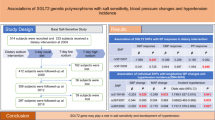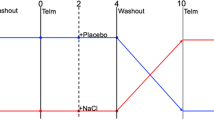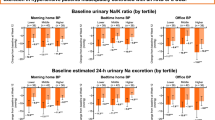Abstract
Dopamine via G-protein-coupled receptor kinase 4 (GRK-4) regulates sodium (Na) balance in the proximal tubule of the kidney. Single-nucleotide polymorphisms of GRK-4 have been linked to impaired natriuresis and salt-sensitive hypertension. The purpose of this report was to determine the effect of GRK-4 gene polymorphisms on the blood pressure (BP) responses to dietary intervention. Black subjects aged 50–75 years with mild-to-moderate hypertension were randomised to an 8-week dietary intervention (n=40) or standard diet (n=40). BP was measured at baseline and at 8 weeks using 24-h ambulatory BP. All subjects underwent DNA analysis for the R65L and A142V polymorphisms. Data were analysed using generalised linear models. For the whole group, between-diet differences in mean 24-h ambulatory systolic BP was −4.53 mm Hg (95% confidence interval −9.05 to −0.01, P=0.05). In the intervention arm, the combined CC and CT group of the A142V showed a significant reduction in both systolic and diastolic ambulatory BP (−10 mm Hg, P=0.023 and −6.5 mm Hg, P=0.01, respectively), whereas the TT group demonstrated no reduction. Similarly, the combined GG and GT groups of the R65L showed a significant reduction in ambulatory BP (−10.6 mm Hg for systolic, P=0.004 and 5.8 mm Hg for diastolic, P=0.006). There was no response in the TT group. GRK-4 polymorphisms predict BP response to dietary modification in Black subjects with mild-to-moderate hypertension. These data may provide at least one among a range of clinical tools to target selected hypertensives to dietary intervention.
This is a preview of subscription content, access via your institution
Access options
Subscribe to this journal
Receive 12 digital issues and online access to articles
$119.00 per year
only $9.92 per issue
Buy this article
- Purchase on Springer Link
- Instant access to full article PDF
Prices may be subject to local taxes which are calculated during checkout
Similar content being viewed by others
References
Steyn K, Gaziano TA, Bradshaw D, Laubscher R, Fourie J . For the South African demographic and health coordinating team. J Hypertens 2001; 19: 1717–1725.
Rayner B . Hypertension: detection and management in South Africa. Nephron 2010; 116: c269–c273.
Charlton KE, Steyn K, Levitt NS, Zulu JV, Jonathan D, Veldman FJ et al. Ethnic differences in intake andexcretion of sodium, potassium, calcium and magnesium inSouth Africans. Eur J Cardiovasc Prev Rehabil 2005; 12: 355–362.
Charlton KE, Steyn K, Levitt NS, Zulu JV, Jonathan D, Veldman FJ et al. Diet and blood pressure in South Africa: the intake of foods containing sodium, potassium, calcium and magnesium in three ethnic groups. Nutrition 2005; 21: 39–50.
Matlou SM, Isles CG, Higgs A, Milne FJ, Murray GD, Schultz E et al. Potassium supplementation in blacks with mild to moderate essential hypertension. J Hypertens 1986; 4: 61–64.
World Health Organization/Food and Agricultural Organization Expert Consultation on Diet. Nutrition and the Prevention of Chronic Diseases. (Background paper on the Scientific Basis for Diet, Nutrition and the Prevention of Cardiovascular Disease, Annex 4). WHO: Geneva. 28 January–1 February 2002.
Sacks FM, Svetky LP, Vollmer WM LJ, Bray GA, Harsha D, Obarzanek E et al. Effects on blood pressure of reduced dietary sodium and the dietary approaches to stop hypertension (DASH) diet. New Engl J Med 2001; 344: 3–10.
Charlton KE, Steyn K, Levitt NS, Peer N, Jonathan D, Gogela T et al. A food-based dietary strategy lowers blood pressure in a low socio-economic setting: a randomised study in South Africa. Public Health Nutr 2008; 11: 1397–1406.
Shih PA, O’Connor DT . Hereditary determinants of human hypertension: strategies in the setting of genetic complexity. Hypertension 2008; 51: 1456–1464.
Lifton RP, Gharavi AG, Geller DS . Molecular mechanisms of human hypertension. Cell 2001; 104: 545–556.
Weinberger MH . Salt sensitivity of blood pressure in humans. Hypertension 1996; 27: 481–490.
Sullivan JM, Prewitt RL, Ratts TE . Sodium sensitivity in normotensive and borderline hypertensive humans. Am J Med Sci 1988; 295 (4): 370–377.
Rayner BL, Myers JE, Opie LH, Trinder YA, Davidson JS . Screening for primary aldosteronism--normal ranges for aldosterone and renin in three South African population groups. S Afr Med J 2001; 91: 594–599.
Jose PA, Eisner GM, Felder RA . Dopamine and the kidney: a role in hypertension? Curr Opin Nephrol Hypertens 2003; 12: 189–194.
Felder R, Sanada H, Xu J, Pei-Ying Y, Watanabe H, Asico L et al. G protein-coupled receptor kinase 4 variants in human essential hypertension. Proc Natl Acad Sci USA 2002; 99: 3872–3877.
Sanada H, Yatabe J, Midorikawa S, Hashimoto S, Watanabe T, Moore JH et al. Single-nucleotide polymorphisms for diagnosis of salt-sensitive hypertension. Clin Chem 2006; 52: 352–360.
Zhu H, Lu Y, Wang X, Snieder H, Treiber FA, Harshfield GA et al. The G protein-coupled receptor kinase 4 gene modulates stress-induced sodium excretion in black normotensive adolescents. Pediatr Res 2006; 60: 440–442.
Goodwin J, Bilous M, Winship S, Finn P, Jones SC . Validation of the Oscar 2 oscillometric 24-h ambulatory blood pressure monitor according to the British Hypertension Society protocol. Blood Press Monit 2007; 12: 113–117.
Androgué HJ, Madias ME . Mechanisms of disease. Sodium and potassium in the pathogenesis of disease. N Engl J Med 2007; 356: 1956–1978.
Acknowledgements
This study was funded by a doctoral fellowship provided by Unilever South Africa Foods and by additional financial support from Sasko Milling and Baking (Division of Pioneer Foods South Africa) and research grants provided by the South African Medical Research Council, the Circulatory Diseases Research Fund, the South African Hypertension Society and the THRIP initiative of the National Research Foundation. The Low Sodium Sea Salt Co Ltd (UK) provided the salt replacement (SOLO) and Unilever provided margarine, Aromat, soup mix and stock cubes for both the test and control groups, free-of-charge. We would like to thank Zaironessa Latief for performing the genetic analysis.
Author information
Authors and Affiliations
Corresponding author
Ethics declarations
Competing interests
The authors declare no conflict of interest.
Rights and permissions
About this article
Cite this article
Rayner, B., Ramesar, R., Steyn, K. et al. G-protein-coupled receptor kinase 4 polymorphisms predict blood pressure response to dietary modification in Black patients with mild-to-moderate hypertension. J Hum Hypertens 26, 334–339 (2012). https://doi.org/10.1038/jhh.2011.33
Received:
Revised:
Accepted:
Published:
Issue Date:
DOI: https://doi.org/10.1038/jhh.2011.33
Keywords
This article is cited by
-
Inverse Salt Sensitivity of Blood Pressure: Mechanisms and Potential Relevance for Prevention of Cardiovascular Disease
Current Hypertension Reports (2022)
-
Sodium sensitivity of blood pressure in Chinese populations
Journal of Human Hypertension (2020)
-
Recent advances in understanding hypertension development in sub-Saharan Africa
Journal of Human Hypertension (2017)
-
Common variants of the G protein-coupled receptor type 4 are associated with human essential hypertension and predict the blood pressure response to angiotensin receptor blockade
The Pharmacogenomics Journal (2016)



